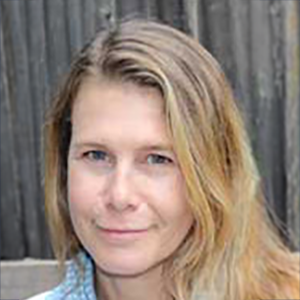Adrienne Russell is Mary Laird Wood Professor of Communication and co-director of the Center for Journalism, Media, and Democracy. Her research lies at the intersection of journalism, technology and political communication. It focuses on emerging technologies and pressing social problems, with an eye toward how to foster democratic and participatory publics. Her most recent book, The Mediated Climate (Columbia University Press 2023), explores the overlapping climate and information crises, examining how journalism, activism, and Big Tech compete to influence the public.
She is also author of Networked: A Contemporary History of News in Transition (2011), which explores the transformations tied to the proliferation of the web and mobile technologies since the early 1990s, and Journalism as Activism: Recoding Media Power (2016), which highlights ways media activists adept at using and creating new communication tools are taking up the work of journalists, expanding the field in significant ways, and shaping on a new level traditional news stories and genres. She is co-editor of the books Rethinking Media Research for Changing Societies (Cambridge University Press 2021), Journalism and the NSA Revelations (Reuters 2017), and International Blogging: Identity, Politics and Networked Publics (Peter Lang 2009).
Russell is editor, together with Matt Powers, of “2K,” a special section of the journal Social Media + Society that is dedicated to public scholarship related to media and technology. She serves on the editorial boards of Journalism: Theory, Practice and Criticism; Social Media + Society; Journal of Broadcasting & Electronic Media; Kaleidoscope: The Journal of Alternative Media and Social Movements, and of Mimesis International publishing house.
Since 2008 she has been a member of the MediaClimate research team, an international group of scholars that conducts comparative studies on transnational coverage of the annual United Nations climate summits and of the Intergovernmental Panel on Climate Change reports.
She has held fellowships with the Annenberg Center at the University of Southern California and the Department of Media and Communication at the London School of Economics.
Selected publications
Climate Crisis
- The Mediated Climate: How Journalists, Big Tech and Activists are Vying for our Environmental and Media Futures, Columbia University Press, 2023.
- “Niche climate news sites and the changing context of covering catastrophe,” co-author with Jarkko Kangas, Risto Kunelius, and James Painter, Journalism: Theory Practice Criticism, 2022.
- “The Journalism in Climate Change Websites: Their Distinct Forms of Specialism, Content, and Role Perceptions,” co-author with Jarkko Kangas, Risto Kunelius, and James Painter, Journalism Practice, 2022.
- “Beyond the boundaries of science: Resistance to misinformation by citizen scientists,’” co-author with Matt Tegelberg, Journalism: Theory Practice Criticism, 2019.
- “Climate Justice Movement, Hacktivist Sensibilities, and Prototyping Change,” in Graham Meikle ed. Routledge Companion to Media and Activism, London: Routledge, 2017.
- Something Old, Something New: Digital Media and the Coverage of Climate Change, co-authored with James Painter, María Carmen Erviti, Richard Fletcher, Candice Howarth, Silje Kristiansen, Bienvenido León, Alan Ouakrat, and Mike S. Schäfer, Oxford Reuters Institute/I.B. Tauris book series, 2016.
- “Innovation in Hybrid Spaces: The 2011 UN Climate Summit and the Changing Journalism Field,” Journalism: Theory, Practice, and Criticism, Vol. 14 no. 7, October 2013.
- “Digital Networks and Shifting Climate News,” co-author with Dmitry Yagodin, Matt Tegelberg, Ville Kumpu and Mofizur Rhaman, in Risto Kunelius, Elisabeth Eide, eds. Transnational Media Events: The Global Media Landscape and News of the Climate. Nordicom: Gothenburg, Sweden, 2012.
Networked journalism/networked publics
- “News flashpoints: Networked journalism and waves of coverage of social problems,” co-author with Silvio Waisbord, Journalism & Mass Communication Quarterly, 2020.
- “Coming to terms with dysfunctional hybridity: A conversation with Andrew Chadwick on the challenges to liberal democracy in the second-wave networked era,” Studies in Communication Sciences, 2020.
- What is Media Research For? Essays on data, journalism, inclusion, and engagement, Rethinking Media Research for Changing Societies, co-editor with Matt Powers, Cambridge: Cambridge University Press, 2020.
- “‘This time it’s different’: Covering threats to journalism and the eroding public sphere,” Journalism: Theory, Practice, and Criticism, twentieth-anniversary issue on the challenges facing journalism today, Vol. 20 no. 1, January 2019.
- “Networked Journalism,” in Tamara Witschge, C. W. Anderson, David Domingo, Alfred Hermida, eds. The Sage Handbook of Digital Journalism. New York: Sage, 2015.
- Networked: A Contemporary History of News in Transition, Polity Press, 2011.
- International Blogging: Identity, Politics, and Networked Publics, co-editor with Nabil Echchaibi, Peter Lang, 2009.
Surveillance
- Journalism and the NSA Revelations: Privacy, Security and the Press, co-editor with Risto Kunelius, Heikki Heikkilä, and Dmitry Yagodin, Oxford Reuters Institute/I.B. Tauris book series, 2016.
- “The Snowden Revelations and the Networked Fourth Estate,” co-author with Silvio Waisbord, International Journal of Communication, special issue on Digital Citizenship and the Surveillance Society, 2016.
Media activism
- “Nuit Debout: Representations, Affect and Prototyping Change,” International Journal of Communication, special issue on Nuit Debout, 2018.
- Journalism as Activism: Recoding Media Power, Polity Press, 2016.
- Journalism: Theory, Practice, and Criticism, editor of issue on global media activism, October 2013.
- New Media and Society, editor of issue on new media and global political resistance, August 2005.

